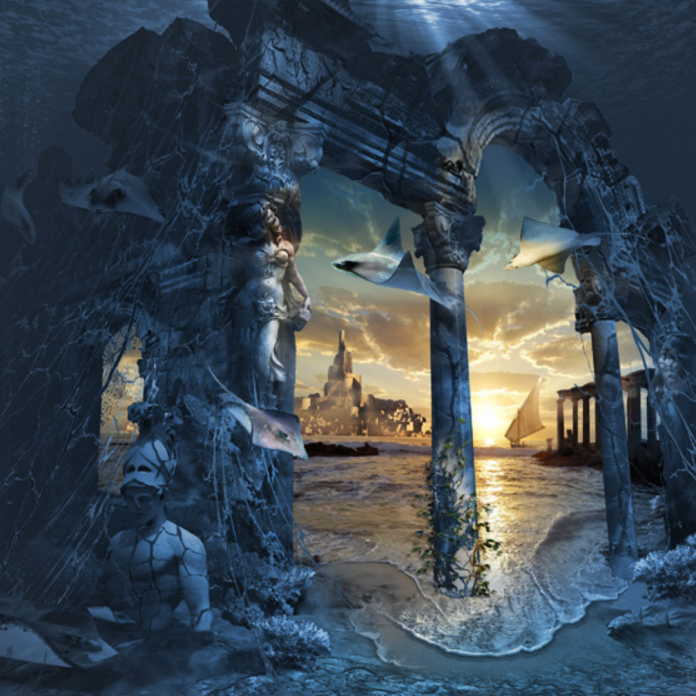Atlantis has captivated imaginations for thousands of years. First described by the ancient Greek philosopher Plato around 360 B.C., the tale of this powerful and advanced civilization has sparked countless theories and debates. In his Socratic dialogues Timaeus and Critias, Plato tells of a mighty empire beyond the Pillars of Hercules (now known as the Strait of Gibraltar), which flourished 9,000 years before his time.
According to his account, Atlantis was a wealthy and technologically sophisticated island civilization with impressive architecture and a formidable military. But after a moral decline, it was destroyed in a single day and night of catastrophe, sinking into the ocean around 9,600 B.C.
Was Plato recounting a real historical event, or was Atlantis a fictional allegory? Here are six of the most compelling theories about the lost city:
1. Atlantis Was a Mid-Atlantic Continent That Sank
The idea of Atlantis as a real place didn’t gain traction until the 19th century, when writer Ignatius Donnelly published Atlantis: The Antediluvian World in 1882. Donnelly argued that the achievements of ancient civilizations—such as metallurgy, agriculture, and language—were too advanced to have developed independently, and must have come from a more ancient, advanced culture.
Believing the Atlantic Ocean was much shallower than it is, Donnelly claimed that Atlantis sank exactly where Plato said it did—just beyond the Pillars of Hercules. Although modern oceanography and plate tectonics have debunked his theory, some still support it due to its fidelity to Plato’s original location.
2. Atlantis Was Swallowed by the Bermuda Triangle
Building on Donnelly’s ideas, author Charles Berlitz suggested in the 1970s that Atlantis lay off the coast of the Bahamas and had vanished due to mysterious forces within the Bermuda Triangle—a region infamous for unexplained ship and plane disappearances.
Proponents of this theory point to the underwater formations near Bimini, which some claim resemble roads or walls. However, scientists have studied these structures and determined they are naturally occurring beach rock formations.
3. Atlantis Was Actually Antarctica
Another theory places Atlantis at the South Pole. In his 1958 book Earth’s Shifting Crust, Charles Hapgood proposed that Antarctica once lay in a more temperate region. According to him, a sudden shift in the Earth’s crust displaced the continent to its current icy location, freezing a once-thriving civilization beneath the ice.
Hapgood’s idea gained attention, even earning a foreword by Albert Einstein, but it fell out of favor with the rise of modern plate tectonic theory, which explains continental drift through slow, consistent movement rather than sudden shifts.
4. The Atlantis Story Reflects the Black Sea Flood
This theory suggests Plato’s Atlantis was not a literal place, but a memory of a real catastrophic event: the flooding of the Black Sea around 5600 B.C. At that time, the Black Sea was a freshwater lake. When the Mediterranean Sea breached the Bosporus, saltwater flooded in rapidly, expanding the sea and submerging coastal settlements.
The massive flood may have inspired ancient flood myths, which were passed down through generations and possibly influenced Plato’s tale of a lost civilization.
5. Atlantis Was the Minoan Civilization
One of the most plausible historical parallels to Atlantis is the Minoan civilization, which thrived on the Greek islands of Crete and Thera (modern-day Santorini) between roughly 2500 and 1600 B.C.
The Minoans were an advanced society with impressive architecture, paved roads, and Europe’s first written language (Linear A). But their civilization came to a sudden end after a massive volcanic eruption on Thera. The resulting earthquakes and tsunamis likely devastated Minoan cities and made them vulnerable to conquest. This sudden and dramatic collapse has led some to believe the Minoans inspired Plato’s story.
6. Atlantis Was Purely Fiction—A Moral Allegory by Plato
The most widely accepted view among historians and scientists is that Atlantis never existed at all. Many scholars believe Plato created Atlantis as a cautionary tale—a fictional allegory about the dangers of pride and the corruption of power.
There are no known references to Atlantis in any ancient Greek texts outside of Plato’s dialogues, and no physical evidence has ever been found to support the existence of a sunken civilization of its scale. In this view, Atlantis was Plato’s philosophical invention, designed to illustrate how even the most advanced societies can fall due to human hubris.
Whether you see Atlantis as myth, metaphor, or mystery, its legacy endures—fueling exploration, inspiring imagination, and keeping the question alive: could such a place have ever really existed?
By History


